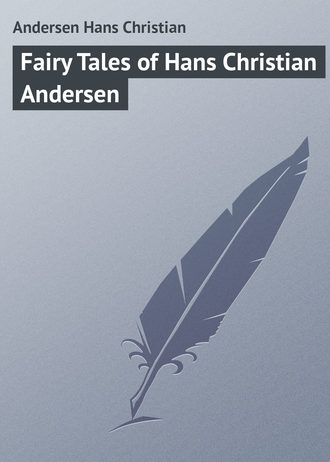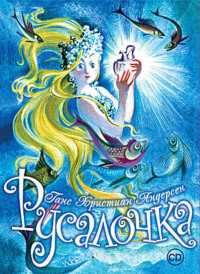 полная версия
полная версияFairy Tales of Hans Christian Andersen
In the meantime the willow tree near the drawbridge had grown up into a splendid tree, and stood there, free, and was never clipped. "It is our genealogical tree," said the old people to their children, "and therefore it must be honoured."
A hundred years had elapsed. It was in our own days; the lake had been transformed into marsh land; the whole baronial seat had, as it were, disappeared. A pool of water near some ruined walls was the only remainder of the deep ditches; and here stood a magnificent old tree with overhanging branches – that was the genealogical tree. Here it stood, and showed how beautiful a willow can look if one does not interfere with it. The trunk, it is true, was cleft in the middle from the root to the crown; the storms had bent it a little, but it still stood there, and out of every crevice and cleft, in which wind and weather had carried mould, blades of grass and flowers sprang forth. Especially above, where the large boughs parted, there was quite a hanging garden, in which wild raspberries and hart's-tongue ferns throve, and even a little mistletoe had taken root, and grew gracefully in the old willow branches, which were reflected in the dark water beneath when the wind blew the chickweed into the corner of the pool. A footpath which led across the fields passed close by the old tree. High up, on the woody hillside, stood the new mansion. It had a splendid view, and was large and magnificent; its window panes were so clear that one might have thought there were none there at all. The large flight of steps which led to the entrance looked like a bower covered with roses and broad-leaved plants. The lawn was as green as if each blade of grass was cleaned separately morning and evening. Inside, in the hall, valuable oil paintings were hanging on the walls. Here stood chairs and sofas covered with silk and velvet, which could be easily rolled about on castors; there were tables with polished marble tops, and books bound in morocco with gilt edges. Indeed, well-to-do and distinguished people lived here; it was the dwelling of the baron and his family. Each article was in keeping with its surroundings. "Everything in the right place" was the motto according to which they also acted here, and therefore all the paintings which had once been the honour and glory of the old mansion were now hung up in the passage which led to the servants' rooms. It was all old lumber, especially two portraits – one representing a man in a scarlet coat with a wig, and the other a lady with powdered and curled hair holding a rose in her hand, each of them being surrounded by a large wreath of willow branches. Both portraits had many holes in them, because the baron's sons used the two old people as targets for their crossbows. They represented the counsellor and his wife, from whom the whole family descended. "But they did not properly belong to our family," said one of the boys; "he was a pedlar and she kept the geese. They were not like papa and mamma." The portraits were old lumber, and "everything in its right place." That was why the great-grandparents had been hung up in the passage leading to the servants' rooms.
The son of the village pastor was tutor at the mansion. One day he went for a walk across the fields with his young pupils and their elder sister, who had lately been confirmed. They walked along the road which passed by the old willow tree, and while they were on the road she picked a bunch of field-flowers. "Everything in the right place," and indeed the bunch looked very beautiful. At the same time she listened to all that was said, and she very much liked to hear the pastor's son speak about the elements and of the great men and women in history. She had a healthy mind, noble in thought and deed, and with a heart full of love for everything that God had created. They stopped at the old willow tree, as the youngest of the baron's sons wished very much to have a flute from it, such as had been cut for him from other willow trees; the pastor's son broke a branch off. "Oh, pray do not do it!" said the young lady; but it was already done. "That is our famous old tree. I love it very much. They often laugh at me at home about it, but that does not matter. There is a story attached to this tree." And now she told him all that we already know about the tree – the old mansion, the pedlar and the goose-girl who had met there for the first time, and had become the ancestors of the noble family to which the young lady belonged.
"They did not like to be knighted, the good old people," she said; "their motto was 'everything in the right place,' and it would not be right, they thought, to purchase a title for money. My grandfather, the first baron, was their son. They say he was a very learned man, a great favourite with the princes and princesses, and was invited to all court festivities. The others at home love him best; but, I do not know why, there seemed to me to be something about the old couple that attracts my heart! How homely, how patriarchal, it must have been in the old mansion, where the mistress sat at the spinning-wheel with her maids, while her husband read aloud out of the Bible!"
"They must have been excellent, sensible people," said the pastor's son. And with this the conversation turned naturally to noblemen and commoners; from the manner in which the tutor spoke about the significance of being noble, it seemed almost as if he did not belong to a commoner's family.
"It is good fortune to be of a family who have distinguished themselves, and to possess as it were a spur in oneself to advance to all that is good. It is a splendid thing to belong to a noble family, whose name serves as a card of admission to the highest circles. Nobility is a distinction; it is a gold coin that bears the stamp of its own value. It is the fallacy of the time, and many poets express it, to say that all that is noble is bad and stupid, and that, on the contrary, the lower one goes among the poor, the more brilliant virtues one finds. I do not share this opinion, for it is wrong. In the upper classes one sees many touchingly beautiful traits; my own mother has told me of such, and I could mention several. One day she was visiting a nobleman's house in town; my grandmother, I believe, had been the lady's nurse when she was a child. My mother and the nobleman were alone in the room, when he suddenly noticed an old woman on crutches come limping into the courtyard; she came every Sunday to carry a gift away with her.
"'There is the poor old woman,' said the nobleman; 'it is so difficult for her to walk.'
"My mother had hardly understood what he said before he disappeared from the room, and went downstairs, in order to save her the troublesome walk for the gift she came to fetch. Of course this is only a little incident, but it has its good sound like the poor widow's two mites in the Bible, the sound which echoes in the depth of every human heart; and this is what the poet ought to show and point out – more especially in our own time he ought to sing of this; it does good, it mitigates and reconciles! But when a man, simply because he is of noble birth and possesses a genealogy, stands on his hind legs and neighs in the street like an Arabian horse, and says when a commoner has been in a room: 'Some people from the street have been here,' there nobility is decaying; it has become a mask of the kind that Thespis created, and it is amusing when such a person is exposed in satire."
Such was the tutor's speech; it was a little long, but while he delivered it he had finished cutting the flute.
There was a large party at the mansion; many guests from the neighbourhood and from the capital had arrived. There were ladies with tasteful and with tasteless dresses; the big hall was quite crowded with people. The clergymen stood humbly together in a corner, and looked as if they were preparing for a funeral, but it was a festival – only the amusement had not yet begun. A great concert was to take place, and that is why the baron's young son had brought his willow flute with him; but he could not make it sound, nor could his father, and therefore the flute was good for nothing.
There was music and songs of the kind which delight most those that perform them; otherwise quite charming!
"Are you an artist?" said a cavalier, the son of his father; "you play on the flute, you have made it yourself; it is genius that rules – the place of honour is due to you."
"Certainly not! I only advance with the time, and that of course one can't help."
"I hope you will delight us all with the little instrument – will you not?" Thus saying he handed to the tutor the flute which had been cut from the willow tree by the pool; and then announced in a loud voice that the tutor wished to perform a solo on the flute. They wished to tease him – that was evident, and therefore the tutor declined to play, although he could do so very well. They urged and requested him, however, so long, that at last he took up the flute and placed it to his lips.
That was a marvellous flute! Its sound was as thrilling as the whistle of a steam engine; in fact it was much stronger, for it sounded and was heard in the yard, in the garden, in the wood, and many miles round in the country; at the same time a storm rose and roared; "Everything in the right place." And with this the baron, as if carried by the wind, flew out of the hall straight into the shepherd's cottage, and the shepherd flew – not into the hall, thither he could not come – but into the servants' hall, among the smart footmen who were striding about in silk stockings; these haughty menials looked horror-struck that such a person ventured to sit at table with them. But in the hall the baron's daughter flew to the place of honour at the end of the table – she was worthy to sit there; the pastor's son had the seat next to her; the two sat there as if they were a bridal pair. An old Count, belonging to one of the oldest families of the country, remained untouched in his place of honour; the flute was just, and it is one's duty to be so. The sharp-tongued cavalier who had caused the flute to be played, and who was the child of his parents, flew headlong into the fowl-house, but not he alone.
The flute was heard at the distance of a mile, and strange events took place. A rich banker's family, who were driving in a coach and four, were blown out of it, and could not even find room behind it with their footmen. Two rich farmers who had in our days shot up higher than their own corn-fields, were flung into the ditch; it was a dangerous flute. Fortunately it burst at the first sound, and that was a good thing, for then it was put back into its owner's pocket – "its right place."
The next day, nobody spoke a word about what had taken place; thus originated the phrase, "to pocket the flute." Everything was again in its usual order, except that the two old pictures of the peddlar and the goose-girl were hanging in the banqueting-hall. There they were on the wall as if blown up there; and as a real expert said that they were painted by a master's hand, they remained there and were restored. "Everything in the right place," and to this it will come. Eternity is long, much longer indeed than this story.
A ROSE FROM HOMER'S GRAVE
Al the songs of the east speak of the love of the nightingale for the rose in the silent starlight night. The winged songster serenades the fragrant flowers.
Not far from Smyrna, where the merchant drives his loaded camels, proudly arching their long necks as they journey beneath the lofty pines over holy ground, I saw a hedge of roses. The turtle-dove flew among the branches of the tall trees, and as the sunbeams fell upon her wings, they glistened as if they were mother-of-pearl. On the rose-bush grew a flower, more beautiful than them all, and to her the nightingale sung of his woes; but the rose remained silent, not even a dewdrop lay like a tear of sympathy on her leaves. At last she bowed her head over a heap of stones, and said, "Here rests the greatest singer in the world; over his tomb will I spread my fragrance, and on it I will let my leaves fall when the storm scatters them. He who sung of Troy became earth, and from that earth I have sprung. I, a rose from the grave of Homer, am too lofty to bloom for a nightingale." Then the nightingale sung himself to death. A camel-driver came by, with his loaded camels and his black slaves; his little son found the dead bird, and buried the lovely songster in the grave of the great Homer, while the rose trembled in the wind.
The evening came, and the rose wrapped her leaves more closely round her, and dreamed: and this was her dream.
It was a fair sunshiny day; a crowd of strangers drew near who had undertaken a pilgrimage to the grave of Homer. Among the strangers was a minstrel from the north, the home of the clouds and the brilliant lights of the aurora borealis. He plucked the rose and placed it in a book, and carried it away into a distant part of the world, his fatherland. The rose faded with grief, and lay between the leaves of the book, which he opened in his own home, saying, "Here is a rose from the grave of Homer."
Then the flower awoke from her dream, and trembled in the wind. A drop of dew fell from the leaves upon the singer's grave. The sun rose, and the flower bloomed more beautiful than ever. The day was hot, and she was still in her own warm Asia. Then footsteps approached, strangers, such as the rose had seen in her dream, came by, and among them was a poet from the north; he plucked the rose, pressed a kiss upon her fresh mouth, and carried her away to the home of the clouds and the northern lights. Like a mummy, the flower now rests in his "Iliad," and, as in her dream, she hears him say, as he opens the book, "Here is a rose from the grave of Homer."
THE SNAIL AND THE ROSE-TREE
Round about the garden ran a hedge of hazel-bushes; beyond the hedge were fields and meadows with cows and sheep; but in the middle of the garden stood a Rose-tree in bloom, under which sat a Snail, whose shell contained a great deal – that is, himself.
"Only wait till my time comes," he said; "I shall do more than grow roses, bear nuts, or give milk, like the hazel-bush, the cows and the sheep."
"I expect a great deal from you," said the rose-tree. "May I ask when it will appear?"
"I take my time," said the snail. "You're always in such a hurry. That does not excite expectation."
The following year the snail lay in almost the same spot, in the sunshine under the rose-tree, which was again budding and bearing roses as fresh and beautiful as ever. The snail crept half out of his shell, stretched out his horns, and drew them in again.
"Everything is just as it was last year! No progress at all; the rose-tree sticks to its roses and gets no farther."
The summer and the autumn passed; the rose-tree bore roses and buds till the snow fell and the weather became raw and wet; then it bent down its head, and the snail crept into the ground.
A new year began; the roses made their appearance, and the snail made his too.
"You are an old rose-tree now," said the snail. "You must make haste and die. You have given the world all that you had in you; whether it was of much importance is a question that I have not had time to think about. But this much is clear and plain, that you have not done the least for your inner development, or you would have produced something else. Have you anything to say in defence? You will now soon be nothing but a stick. Do you understand what I say?"
"You frighten me," said the rose – tree. "I have never thought of that."
"No, you have never taken the trouble to think at all. Have you ever given yourself an account why you bloomed, and how your blooming comes about – why just in that way and in no other?"
"No," said the rose-tree. "I bloom in gladness, because I cannot do otherwise. The sun shone and warmed me, and the air refreshed me; I drank the clear dew and the invigorating rain. I breathed and I lived! Out of the earth there arose a power within me, whilst from above I also received strength; I felt an ever-renewed and ever-increasing happiness, and therefore I was obliged to go on blooming. That was my life; I could not do otherwise."
"You have led a very easy life," remarked the snail.
"Certainly. Everything was given me," said the rose-tree. "But still more was given to you. Yours is one of those deep-thinking natures, one of those highly gifted minds that astonishes the world."
"I have not the slightest intention of doing so," said the snail. "The world is nothing to me. What have I to do with the world? I have enough to do with myself, and enough in myself."
"But must we not all here on earth give up our best parts to others, and offer as much as lies in our power? It is true, I have only given roses. But you – you who are so richly endowed – what have you given to the world? What will you give it?"
"What have I given? What am I going to give? I spit at it; it's good for nothing, and does not concern me. For my part, you may go on bearing roses; you cannot do anything else. Let the hazel bush bear nuts, and the cows and sheep give milk; they have each their public. I have mine in myself. I retire within myself and there I stop. The world is nothing to me."
With this the snail withdrew into his house and blocked up the entrance.
"That's very sad," said the rose tree. "I cannot creep into myself, however much I might wish to do so; I have to go on bearing roses. Then they drop their leaves, which are blown away by the wind. But I once saw how a rose was laid in the mistress's hymn-book, and how one of my roses found a place in the bosom of a young beautiful girl, and how another was kissed by the lips of a child in the glad joy of life. That did me good; it was a real blessing. Those are my recollections, my life."
And the rose tree went on blooming in innocence, while the snail lay idling in his house – the world was nothing to him.
Years passed by.
The snail had turned to earth in the earth, and the rose tree too. Even the souvenir rose in the hymn-book was faded, but in the garden there were other rose trees and other snails. The latter crept into their houses and spat at the world, for it did not concern them.
Shall we read the story all over again? It will be just the same.
A STORY FROM THE SAND-HILLS
This story is from the sand-dunes or sand-hills of Jutland, but it does not begin there in the North, but far away in the South, in Spain. The wide sea is the highroad from nation to nation; journey in thought; then, to sunny Spain. It is warm and beautiful there; the fiery pomegranate flowers peep from among dark laurels; a cool refreshing breeze from the mountains blows over the orange gardens, over the Moorish halls with their golden cupolas and coloured walls. Children go through the streets in procession with candles and waving banners, and the sky, lofty and clear with its glittering stars, rises above them. Sounds of singing and castanets can be heard, and youths and maidens dance upon the flowering acacia trees, while even the beggar sits upon a block of marble, refreshing himself with a juicy melon, and dreamily enjoying life. It all seems like a beautiful dream.
Here dwelt a newly married couple who completely gave themselves up to the charm of life; indeed they possessed every good thing they could desire – health and happiness, riches and honour.
"We are as happy as human beings can be," said the young couple from the depths of their hearts. They had indeed only one step higher to mount on the ladder of happiness – they hoped that God would give them a child, a son like them in form and spirit. The happy little one was to be welcomed with rejoicing, to be cared for with love and tenderness, and enjoy every advantage of wealth and luxury that a rich and influential family can give. So the days went by like a joyous festival.
"Life is a gracious gift from God, almost too great a gift for us to appreciate!" said the young wife. "Yet they say that fulness of joy for ever and ever can only be found in the future life. I cannot realise it!"
"The thought arises, perhaps, from the arrogance of men," said the husband. "It seems a great pride to believe that we shall live for ever, that we shall be as gods! Were not these the words of the serpent, the father of lies?"
"Surely you do not doubt the existence of a future life?" exclaimed the young wife. It seemed as if one of the first shadows passed over her sunny thoughts.
"Faith realises it, and the priests tell us so," replied her husband; "but amid all my happiness I feel that it is arrogant to demand a continuation of it – another life after this. Has not so much been given us in this world that we ought to be, we must be, contented with it?"
"Yes, it has been given to us," said the young wife, "but this life is nothing more than one long scene of trial and hardship to many thousands. How many have been cast into this world only to endure poverty, shame, illness, and misfortune? If there were no future life, everything here would be too unequally divided, and God would not be the personification of justice."
"The beggar there," said her husband, "has joys of his own which seem to him great, and cause him as much pleasure as a king would find in the magnificence of his palace. And then do you not think that the beast of burden, which suffers blows and hunger, and works itself to death, suffers just as much from its miserable fate? The dumb creature might demand a future life also, and declare the law unjust that excludes it from the advantages of the higher creation."
"Christ said: 'In my father's house are many mansions,'" she answered. "Heaven is as boundless as the love of our Creator; the dumb animal is also His creature, and I firmly believe that no life will be lost, but each will receive as much happiness as he can enjoy, which will be sufficient for him."
"This world is sufficient for me," said the husband, throwing his arm round his beautiful, sweet-tempered wife. He sat by her side on the open balcony, smoking a cigarette in the cool air, which was loaded with the sweet scent of carnations and orange blossoms. Sounds of music and the clatter of castanets came from the road beneath, the stars shone above then, and two eyes full of affection – those of his wife – looked upon him with the expression of undying love. "Such a moment," he said, "makes it worth while to be born, to die, and to be annihilated!" He smiled – the young wife raised her hand in gentle reproof, and the shadow passed away from her mind, and they were happy – quite happy.
Everything seemed to work together for their good. They advanced in honour, in prosperity, and in happiness. A change came certainly, but it was only a change of place and not of circumstances.
The young man was sent by his Sovereign as ambassador to the Russian Court. This was an office of high dignity, but his birth and his acquirements entitled him to the honour. He possessed a large fortune, and his wife had brought him wealth equal to his own, for she was the daughter of a rich and respected merchant. One of this merchant's largest and finest ships was to be sent that year to Stockholm, and it was arranged that the dear young couple, the daughter and the son-in-law, should travel in it to St. Petersburg. All the arrangements on board were princely and silk and luxury on every side.
In an old war song, called "The King of England's Son," it says:"Farewell, he said, and sailed away.And many recollect that day.The ropes were of silk, the anchor of gold,And everywhere riches and wealth untold."These words would aptly describe the vessel from Spain, for here was the same luxury, and the same parting thought naturally arose:
"God grant that we once more may meetIn sweet unclouded peace and joy."There was a favourable wind blowing as they left the Spanish coast, and it would be but a short journey, for they hoped to reach their destination in a few weeks; but when they came out upon the wide ocean the wind dropped, the sea became smooth and shining, and the stars shone brightly. Many festive evenings were spent on board. At last the travellers began to wish for wind, for a favourable breeze; but their wish was useless – not a breath of air stirred, or if it did arise it was contrary. Weeks passed by in this way, two whole months, and then at length a fair wind blew from the south-west. The ship sailed on the high seas between Scotland and Jutland; then the wind increased, just as it did in the old song of "The King of England's Son."









